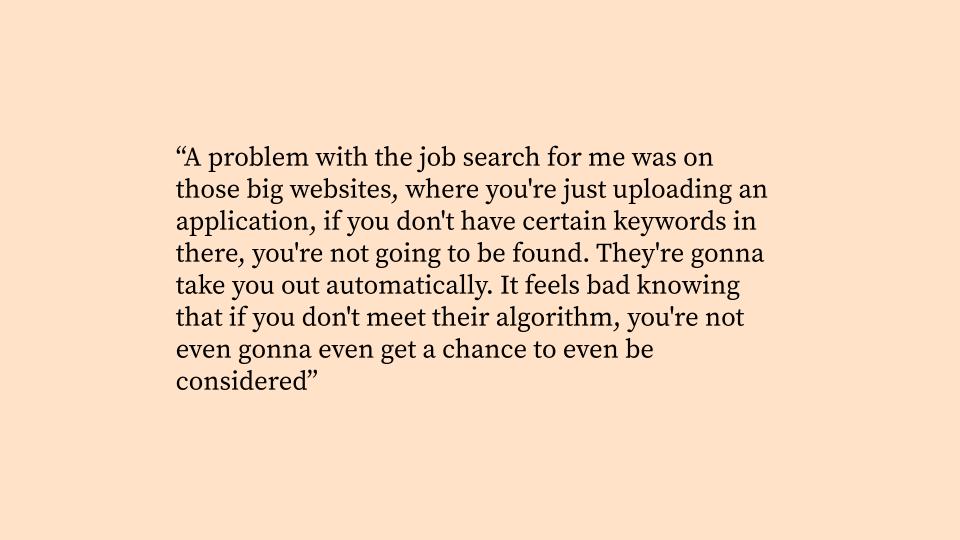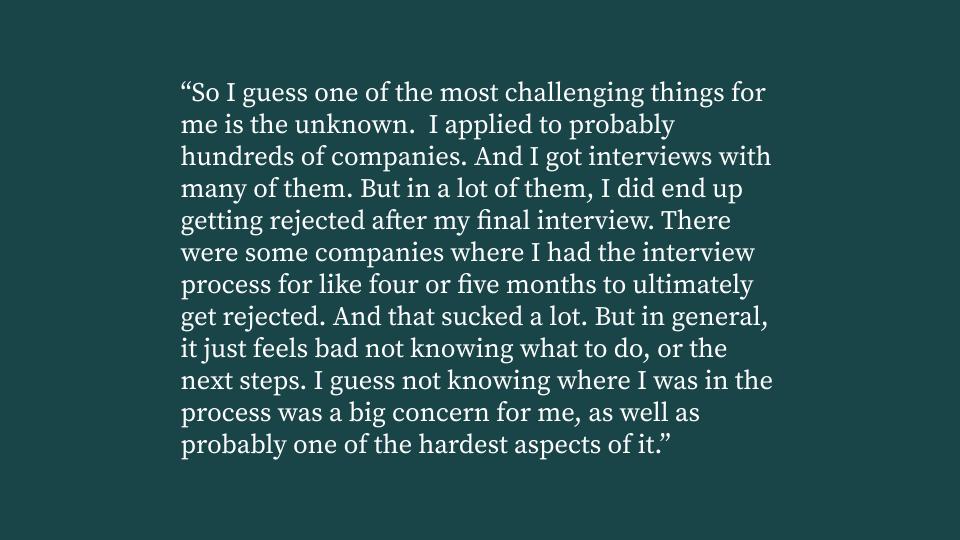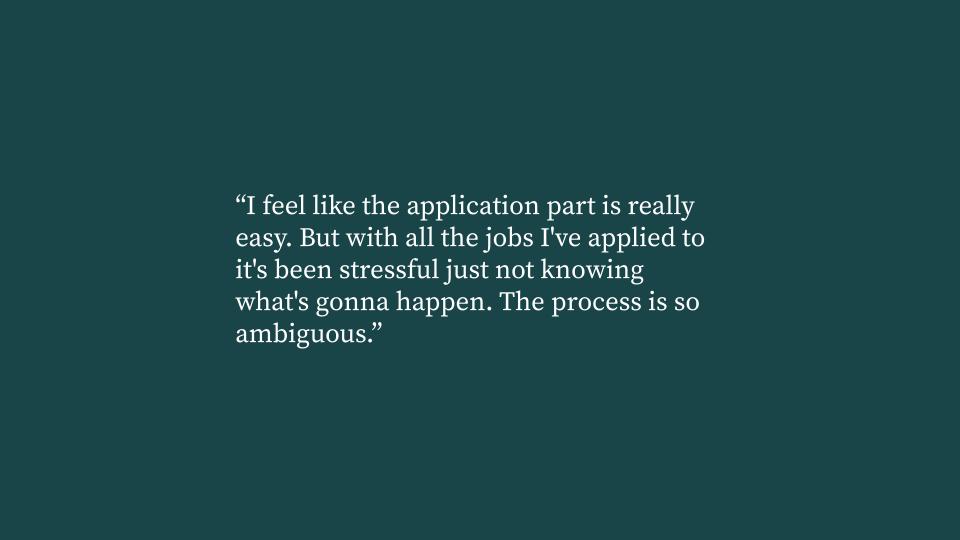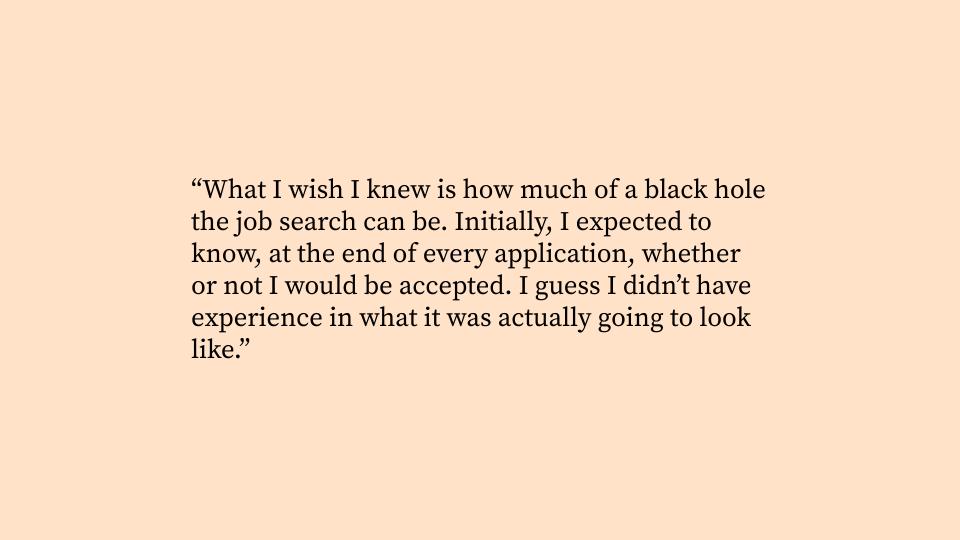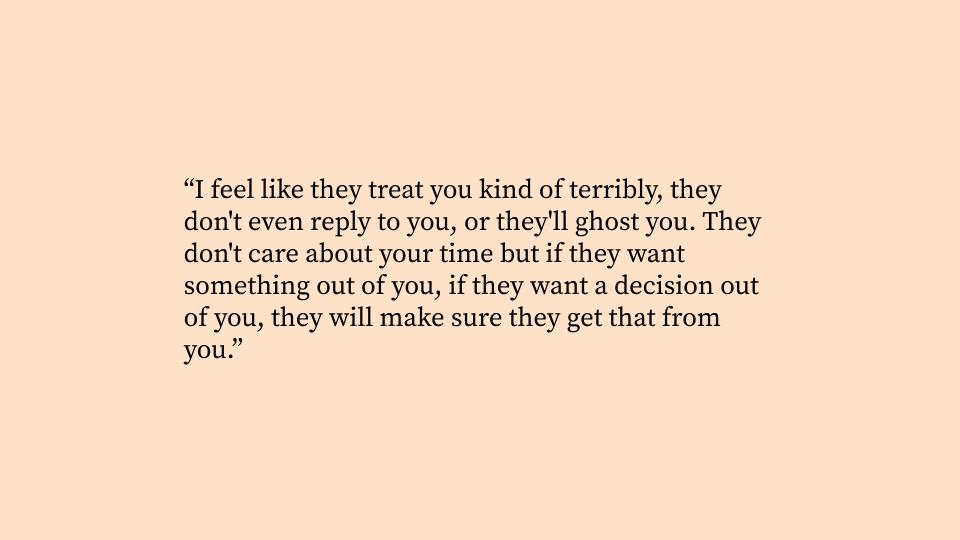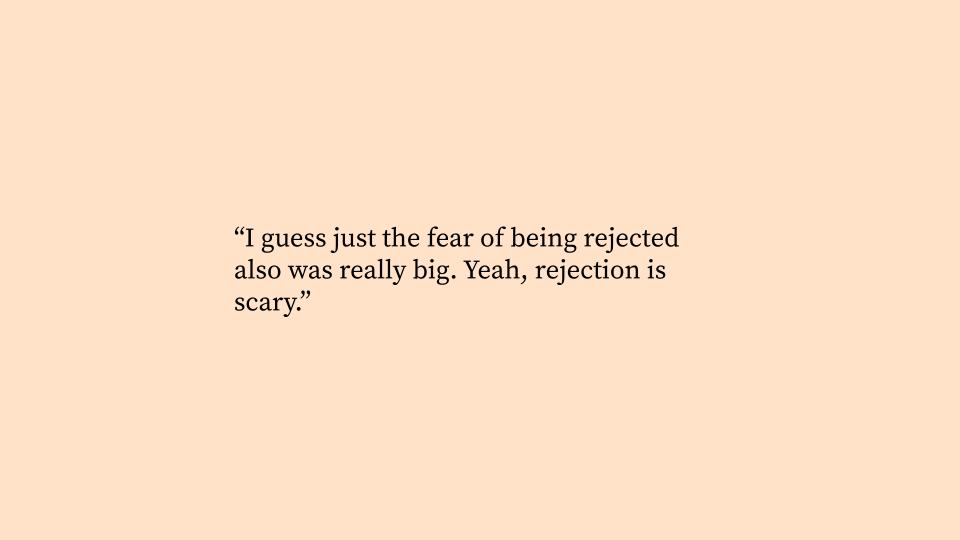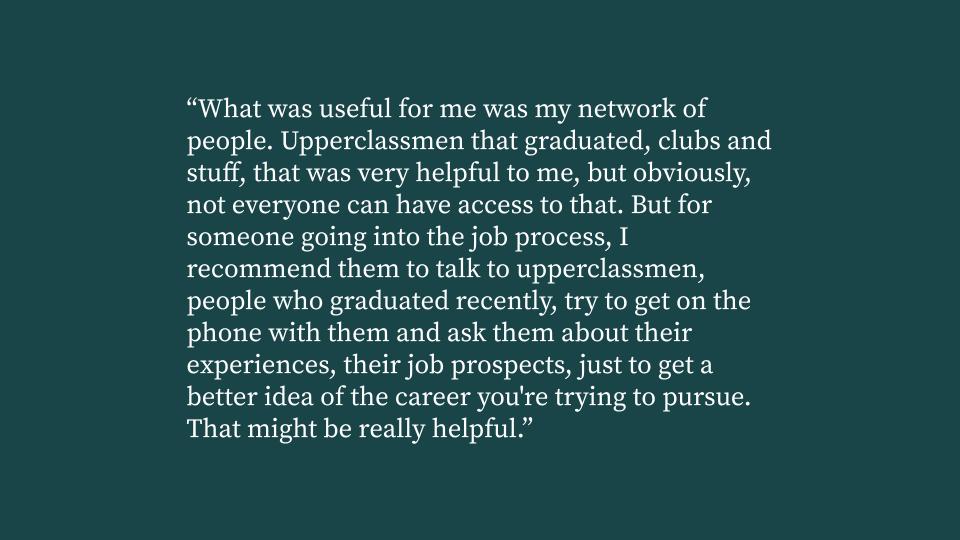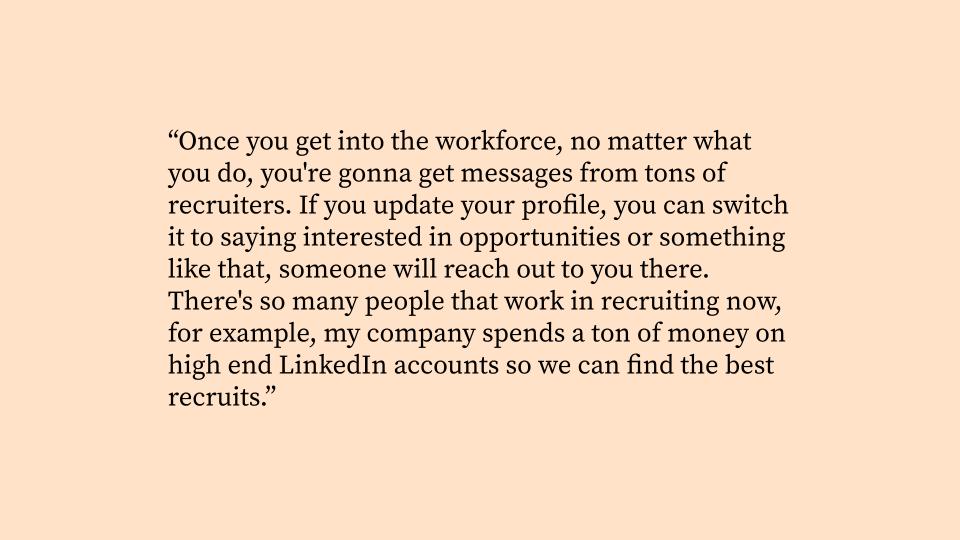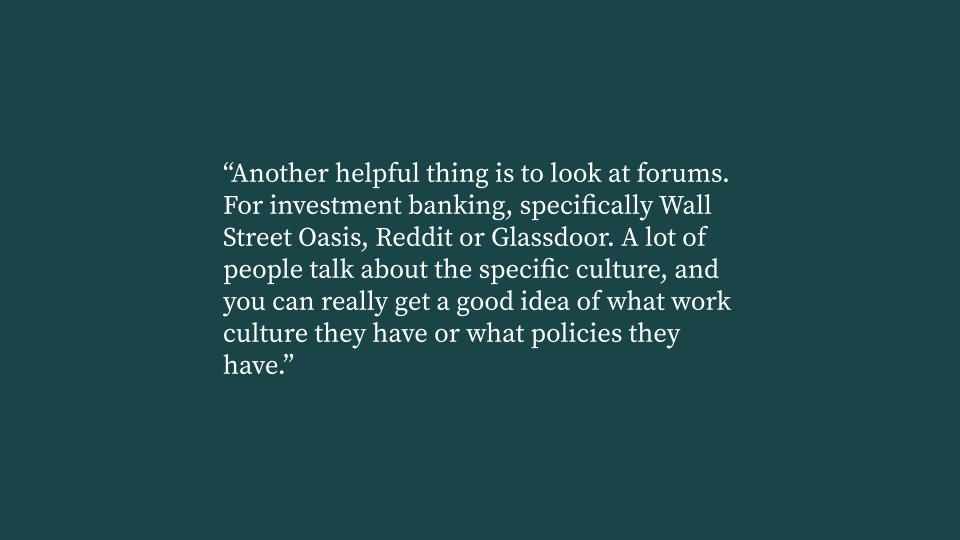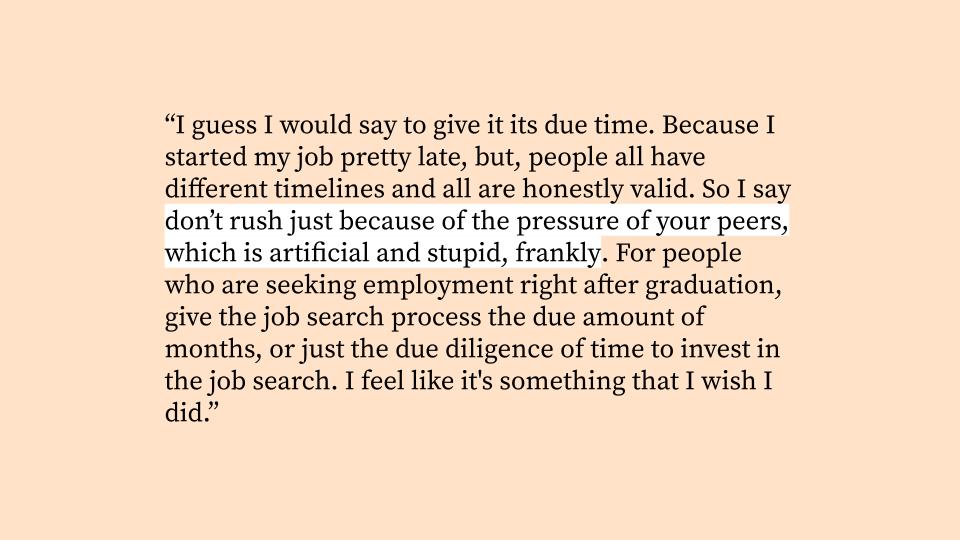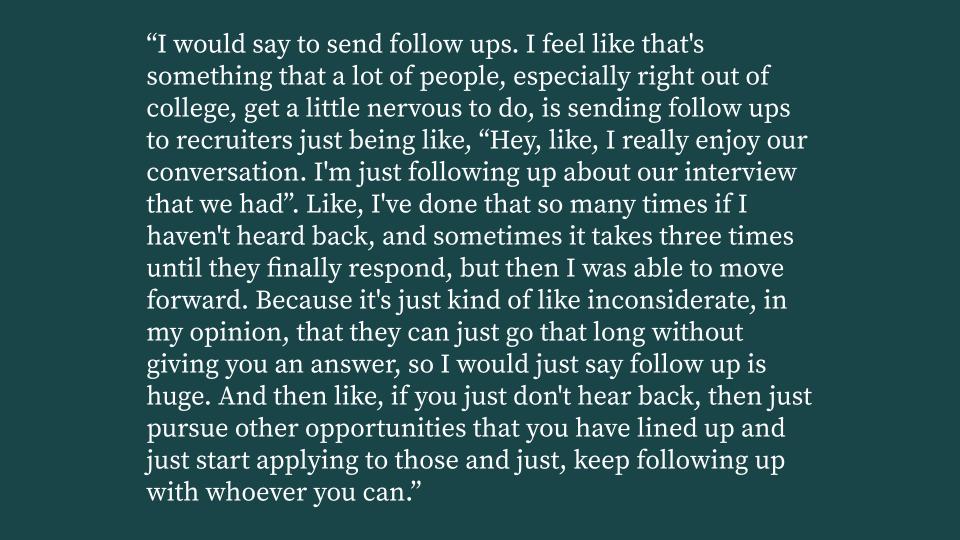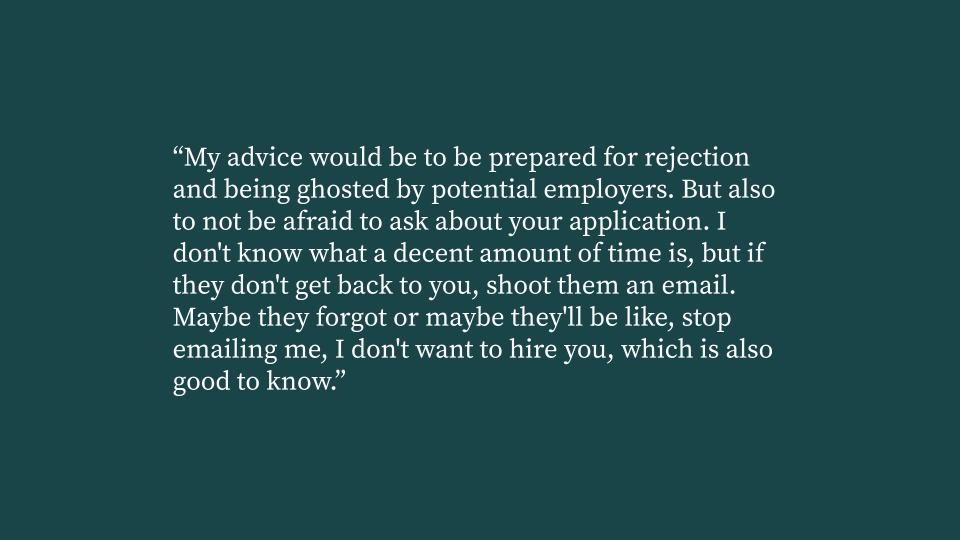
We now move on to the job search.
Just like in terms of work, I asked prospective workers and workers what they thought was hard about the job search.
Most of them thought the job search was absolutely miserable, primarily because the job search process was
- Ambiguous
- Dehumanizing
- Not accessible to non-traditional workers.
Most workers and prospective workers found that the job search was extremely ambiguous and there are a lot of processes that go on that the applicants themselves have no control over. They compare it to a “black box” situation:
“I feel like the biggest challenge is like the mental struggle of not knowing why. It’s just like you put your resume into a black box and something comes out and you have no idea what’s going on within that black box.”
Understanding the job search process was one of the biggest hurdles that all applicants went through. Most of them still say they don’t understand the process at all.
From uncertainty about what companies are looking for:
To the difficulty of understanding where applicants stood in the process.
Another aspect was the general uncertainty about the job itself. Recruiters and job postings typically shy away from transparency in terms of salary, benefits, and job tasks.
One worker put it:
“I think there needs to be more transparency in the job search process. And I think this is something that’s slowly changing, but especially more salary transparency. I mean, honestly, when I talk with recruiters now, the first thing I say, and I know it sounds kind of bad, but the first thing I say is “What does this pay?” “Can you lay out the full compensation and benefits package?” Because I don’t want to spend an hour or 30 minutes on a call and then maybe like four hours interviewing, if we’re not even going to be in the same ballpark.”
This lack of understanding of the whole hiring process makes rejection even harder. When you don’t know what you’re being rejected for, sometimes without having even talked to a recruiter, it makes it hard to understand why you’re being rejected.
The second thing was that the job process is dehumanizing. Applicants felt like they weren’t seen as humans, for their valuable contributions and unique skills. Instead, they were shuffled along like numbers, and employers only cared about certifications, experience and qualifications, instead of seeing them as humans and what they can bring to the company.
One part of what makes the job search so dehumanizing is its inherent tendency to competition.
One worker said that she felt like:
“American culture is very competitive. Employers are always telling you that “This position is really competitive, and we want to see all XYZ about you”. It’s like, why can’t it just be less stressful? Like, why can’t it just be more conversational? Like, get to know the applicant. I feel like it’s just so focused on what your experience is, what your grades are, and what your resume says, versus really getting to know you. I think it’s so important when you’re building a work community, to consider the kinds of people that you want to work with and be around.”
The dehumanizing and competitive culture of the job search makes it so that you are inherently compared to others, which extends to an individual’s self confidence. A lot of respondents reported feeling like they weren’t good enough, and this culture of competition and identity inherently lends itself to comparison. This persists throughout work culture, and even into job board websites.
One respondent put it:
“LinkedIn is the worst. It’s good for seeing job openings, but the whole aspect of other people posting their jobs or posting their accomplishments, it encourages comparison. It just becomes like a work version of social media. It sucks when people are always posting jobs and their accomplishments; like that’s great for you, and nothing against you. But I think that the platform invites people to compare themselves to others in a way that’s not so healthy, especially when getting a job is already so stressful.”
Respondents also wished that the experience was less stressful, because then they would be able to ask better questions and better represent themselves as people throughout the interview process. However, companies may intentionally seek to market themselves as extremely competitive or elite, perhaps in part to cause applicants to shy away from asking hard questions or negotiating terms.
One worker noted that:
“It’s really hard to get a good feel of a company when you’re really stressed out or anxious about the interview. You’re not thinking clearly about what to ask, or maybe you don’t notice potential red flags about a company. I just wish there was a way to get to sit down and meet people without this interview hanging over you. Because I just feel like, sometimes you’re so worried about like what questions you’re going to be asked, or if you’re prepared, you know, stuff like that, that you will forget to ask a really big question, or you won’t be able to get a good read off the person that you’re interviewing, because you’re so focused in on what you’re talking about.”
Even though the job search is difficult, people reported that the easiest part of the job search was applying.
As one respondent put it:
“I wouldn’t say there’s anything particularly easy about the job search other than the fact that you can find a lot of jobs using platforms like Handshake, Indeed or LinkedIn. But at the same time, there’s so much competition, that just applying for jobs is pretty easy, but getting your foot in the door is pretty difficult. Because why would they choose you if there’s like hundreds of others who have good resumes in the pile?”
And finally, accessibility was a huge problem that workers faced in the job search process.
From a lack of entry level jobs and unreasonable job requirements:
“I think the biggest hurdle I kept running into is when you look at job searches for normal jobs, they always require a four year degree. And I’m like, you don’t need a four year degree to do this, but because I don’t have one, I’m automatically getting kicked out of a search. So I think that was one of the biggest things and biggest anxiety creators for me. Looking at some of these jobs, I’m like, you don’t have to have a four year degree to do this well.”
“It was challenging just trying to find a way to market myself. It seems like a lot of entry level positions are asking for a lot of experience or asking for qualifications that are outside of what I was taught in university. So it’s been hard trying to market myself as still being valuable to their company, essentially saying that they should take a risk on me. It’s hard. It’s challenging, and it sometimes feels like an impossible hurdle to get past.”
To the necessity of networking and connections:
“The job search process sucks. I mean, first, it’s just like looking at a lot of job listings. I could have done a better job at networking, but I didn’t. So I would ask for referrals from my friends. Any other companies I would apply to I got rejected. I would first reference job listings, right, or like companies I wanted to work at, see if I know anyone there, if I do, ask them for a referral, apply, blah, blah, blah. That was pretty shitty.”
“I have not been really good with my LinkedIn or networking and stuff. And I know that’s a really big thing in life, pretty much like any job field. And I’m not good at that. And that’s really hard for me. I wish we didn’t have to network so much to find jobs.”
QUESTION: What problems do you have with the job search?
I feel like it just sucks not knowing if they even are looking at it. I know they use those automated scanners to just look for keywords, but it feels so bad knowing I might not even be looked at, just sitting there in the system- when I’m just waiting to hear back. It’s not even going anywhere. It sucks

Now that we’ve seen the problems that workers had with the job search, let’s move on to advice for prospective applicants.
I asked the respondents one question: What advice would you give someone before applying for jobs?
There were a wide range of answers, and I’ve organized them into four sections for you.
- Things to better prepare you for the job search
- Interview advice
- Questions and Red Flags
- How to keep your chin up
Before we start, though, the respondents overwhelmingly emphasize that you should take your time finding a job. While there might be a lot of pressures to find a job, or to find a specific type of job, they felt strongly that it was worth slowing down and taking the time to find a job that’s right for you.
As one respondent put it:
“I wish I knew to just cast a really wide net, and even apply for things that were not directly in line with my life’s purpose or whatever. Because you never know what job will accept you, I guess. And, again, for me, work is a vehicle to do all the life things. So I just wish I was more open to just broadly applying and seeing what happens”
I encourage you to tab through this section and find what’s useful to you. Whether you’re looking for a job right now, or you don’t plan on leaving your job any time soon; I think that reading through these can help you see what other people want out of work, and ways to discern that through the job search process.
In the interviews, one of the biggest themes that came up was that people weren’t prepared for work or the job search. These are a few things that people wish they had done to better prepare themselves for the job search.
One of the biggest ways people felt more confident going into the job search was by talking to their peers and network.
They also mentioned to keep your resume and LinkedIn updated. It becomes helpful in the long run.
Respondents also recommended to engage in projects and internships. While far from ideal, experience speaks volumes on a resume.
“My number one piece of advice, especially in the tech industry, is to work on or make projects. And also do as many internships as you possibly can. Because the more internships you do, the more work experience you get, the less steep transition it’s going to be when you transition into your actual career of learning everything that you need to learn. Because most of the time, you will learn the general workflow and work process in an internship, so it won’t be that hard on you when you first get into a job right after college. And personal projects are just fun to make, and also expand your knowledge of what you actually enjoy doing because you have actually enjoyed the project you make. So that just expands your knowledge.”
And finally, we saw how difficult getting seen is in the world of quick applying and resume scanning. So to get noticed, workers recommend tailoring your resume to the job listing.
“The advice I would give is to tailor your resume to who you’re targeting. You don’t need stuff like you were your swim team captain on a resume for art design. Like some stuff is unnecessary. Clean it up.”
“Tailor your resume as much as you can to the role, and use the language use of keywords you see in the job listing. Turn those bullet points in those job listings into questions, and then answer them. Be prepared to answer them in your resume and also your interviews. That’s like the biggest thing.”
See Resources for a free resume scanner that helps you tailor your resume to the job listing!
Next, getting an interview is hard enough, but respondents emphasized the importance of how you present yourself in the interview.
Hopefully after you make a good impression, it’s time for the company to make a good impression on you. The respondents overwhelmingly emphasized asking questions to detect both green and red flags:
They recommended asking for specifics—if a company says there is a good (insert positive workplace trait here), ask for examples to understand how the company creates and supports that positive trait.

In total, here are some red flags that the participants wanted you to look out for in a job listing or interview. These are phrases that should give you pause—or at least prompt you to ask for detailed explanations—before applying to a position or accepting an offer.
- Be prepared to wear a lot of hats
- Ability to multitask on demand
- Competitive pay
- Fast paced/dynamic environment
- We’re like a family
- Work hard, play hard
- Rockstar/ninja/superhero
- Can do attitude / problem solving
- Team spirit
QUESTION: What are some red flags you avoid in job listings?
I definitely avoid things that talk about wearing multiple hats. Just seems like you’ll be doin a lot of work. Too much work.
They also emphasize negotiating your salary. It might seem disrespectful or like you are endangering the job offer, but you can feel confident that this is a normal part of the process, and you have the right to advocate for yourself.
I wish I could have negotiated my salary. That is one thing I didn’t do, because this was my first full time job offer. I was just thankful to have a job and also scared that if I tried to do a salary negotiation that they would take back their offer, which is what I found not to be the case.
If you go into a big tech company, always ask what level you’re coming in. Because that determines your starting salary and your growth trajectory. Also, negotiate as much as you can in the beginning, before you get the job. Because after you get into the company, it’s going to be really hard to negotiate. And that applies to basically every job. So always try to negotiate and understand what level you’re being hired at.
And finally, they emphasize doing your own research about the company and the salary range your role is usually hired at.
The job search is hard. And we’ve seen how applicants get worn down by how disheartening and disappointing the job search can be. In this final section, workers give people advice on how to keep their chin up.
Your worth isn’t dictated by how fast you find a job, or what kind of job you get. Respondents emphasize that the job search is hard, for everyone, and that shouldn’t affect how you feel about yourself.
And aside from being positive, don’t be afraid to send follow ups! They don’t hurt, and can offer you peace of mind.
QUESTION: What advice would you give someone going through the job search?
When answering this question: consider what was difficult for you, or what was easy? What advantages or disadvantages did you have going into the job search? What do you wish you had known before applying for jobs? How can others make the job search easier?
I cannot emphasize enough, tailor your resume to the job. Literally copy paste the keywords into your resume. They won’t look at you otherwise, esp if its a big company.
Outside of the job search, in the next section, we explore how to maintain a healthy relationship with work.


